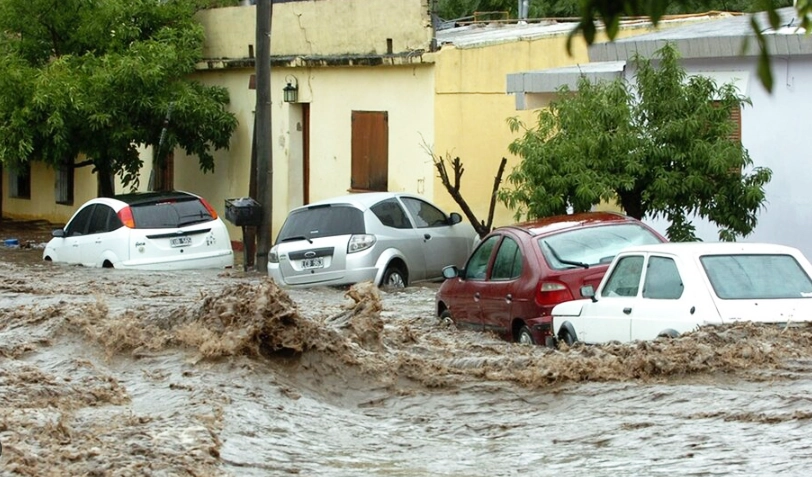“It was Sunday. We were all at home and all of a sudden we were surrounded by water. We were on the roof for six hours until they were able to rescue us,” recalls Sandra, a neighbor of Río Ceballos. On February 15, 2015, residents of several towns in the Sierras Chicas, in the Argentinian province of Córdoba, saw rivers and streams in the area overflow. The riverbeds that were usually used to “get their feet wet” were transformed into an avalanche of water that swept away lives, houses, bridges and everything in its path. In twelve hours it rained 300 millimeters: almost a third of the annual average calculated for this mountainous area.
Two years earlier, a group of scientists from the National University of Córdoba warned about this possibility in a technical report. The uncontrolled advance of the urban frontier and the clearing of native forest could increase the risk of landslides, rock and water, and floods, precisely in the basin of the Ceballos and Saldán rivers, in the Sierras Chicas.
“It was not the rain, it was the clearing” denounced the assembly of self-convened neighbors of the area on the seventh anniversary of the flood that marked the history of the region. At that time, however, the neighbors had not been alerted because the information was simply not available to society.
For this reason, this group of affected people and activists initiated a collective action in which, among other things, they requested the implementation of an early warning system to detect, evaluate, inform and prevent any severe weather phenomena in the province.
Health in a worldwide perspective
Day after day, the media and social networks show the consequences of droughts, floods, extreme temperatures, fires and other environmental catastrophes in different corners of the planet. Some even announce that “the Earth has a fever” or that it is suffering from “an infection called humanity”. Yet, can we speak of planetary health, can we find indicators of this health and measure them, and could this information help us to make better decisions on a global scale?
The effects of climate change are not only evident in the significant increase in extreme weather events, whose growing intensity and magnitude have a direct impact on people’s daily lives. They also have a decisive influence on people’s health indirectly due to the close association between human health and factors such as the quality of water, air and access to food. In fact, various international forums and organizations are warning of the need to adopt a health perspective that incorporates the challenges brought about by climate change.
Such an approach includes a broader set of forces and systems that have an impact on living conditions, such as food and production systems, and even forms of political organization. Moreover, it is necessary to include the complex interconnections and balances between human health and the health of the planet, the latter being understood as a universal right that must be respected for present and future generations.
Measure, integrate and alert
To combine data on the triad of climate, environment, and health as a strategy to monitor those areas that require more attention and care, a consortium of South American researchers from different scientific disciplines and geographies proposes to design a digital platform with publicly accessible information that will be hosted on the website of the National University of Cordoba, in Argentina.
The team intends to collect key data to construct indicators that will bring together data that is currently dispersed, fragmented or expressed in different time scales. It is precisely this dispersion that hinders the creation of an integrated surveillance and monitoring system to address problems at different territorial scales. This platform, therefore, could contribute to the development of interventions for mitigation or adaptation to the climate crisis.
“In all its phases, the participation of key stakeholders and potential users will be promoted,” says Dr. Sonia Muñoz, professor and researcher at the Faculty of Medical Sciences of the National University of Córdoba, who is leading the project. “We are convinced of the strategic importance of transdisciplinarity when thinking and developing the platform, as well as when communicating it to decision-makers and society as a whole”.
For decades, the scientific community has been carrying out various measurements that, in each of their reports, integrate elements that converge in the need to take measures in the face of the climate emergency. Therefore, the possibility of designing a regional cooperative platform that aims to manage integrated data on key indicators in the climate-environment-health triad is a fundamental step in the regional epidemiological panorama. This approach will make it possible to close the gap between research and scientific evidence and public policies and health practices.
Not only is it important to identify hotspots that may involve health risks associated with climate change, it is also essential to develop appropriate strategies to make this information easily accessible to decision-makers such as local, provincial and national authorities in the fields of health, environment science, agriculture, social and education, among others. In this way, the response capacity during climate emergencies and disasters could be improved, thus benefiting society as a whole.
Undoubtedly, what happened in the Sierras Chicas de Córdoba was not a coincidental event or an isolated episode; rather, it is a symptom of an increasingly widespread and frequent phenomenon that needs to be addressed and responded to. The answer lies in gathering scientific evidence, making it accessible to society as a whole and supporting its application in practice.
*This text is a result of the Climate, Environment, and Health + Migration Program developed by the Inter-American Institute for Global Change Research (IAI) and Latinomérica21.
Translated by Micaela Machado Rodrigues from the original in Spanish.












